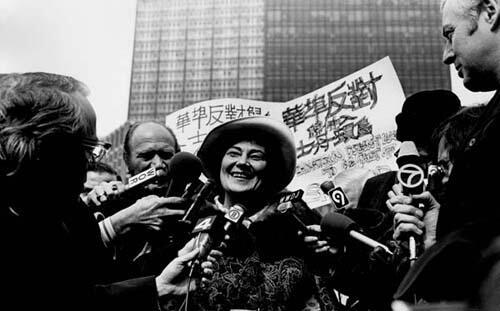Battlin' Bella: Why We Need The ERA Today
Our country is in crisis. While November’s election victories may encourage many of us to feel as though our problems are solved and we can just sit back and relax, this isn’t the case. President Trump may be out of office, but 70 million people still voted for him. He filled not one, not two, but three Supreme Court seats, giving conservative justices lifetime appointments. This is not a time to take a step back. Yes, many of us are exhausted, worn down, and beaten from the last four years, but we must continue to take an active role in bettering our country. No one understood the importance of staying in what can feel like an impossible fight better than Bella Abzug.
Bella Abzug, also known as "Battlin’ Bella," was an activist throughout her life, who also served as a congresswoman from 1971 to 1975. She was an outspoken supporter of women’s rights, civil rights, and peace, proposing a bill on her first day in Congress to remove all American troops from Vietnam. She also helped establish the National Women’s Political Caucus, which fought for complete equality for women in all social and political spheres. Additionally, Bella Abzug served for one year as the head of the National Advisory Committee for Women, a group started by President Carter to help promote equality for women. There’s no doubt that Abzug was a strong and powerful woman who accomplished an impressive amount throughout her lifetime, and I think there’s a lot to learn in particular from her early work.
Fresh out of Columbia Law School in 1948, Abzug took a job as a defense lawyer in the appeals process for Willie McGee. A white woman in Mississippi accused McGee, a Black man, of rape, and when McGee’s case initially went to trial in 1945, the jury of twelve white men found him guilty after less than two and a half minutes. A brutal legal battle ensued. When Bella took over McGee's defense, she sought to clearly connect his case to the larger issue of institutionalized racism. During the appeals process, she claimed that rape laws in the South served not to protect women, but rather to maintain racial and gender inequality. Despite these efforts, they lost the appeal and McGee was executed. Though they were unable to win McGee's case in the larger fight against institutionalized discrimination, Bella Abzug continued to fight unfair laws long after the case alongside groups like the Civil Rights Congress, and started to address them from the legislative side. By pointing out unfair laws and the way they perpetuated segregation, Bella sought to fight the legal discrimination of the Jim Crow system, arguing that those institutional injustices had to be wiped out.
I believe that Bella’s approach must be applied to these issues of inequality that we are still facing today. With Amy Coney Barrett’s confirmation to the Supreme Court, women across the country are justifiably afraid that they will no longer have access to contraceptives or the right to make their own decisions about their bodies. As Bella Abzug sought to connect legal cases to institutionalized discrimination, we must do the same. Rather than clinging to Roe v. Wade, I think it’s far past time we revived the women’s movement in support of the Equal Rights Amendment (ERA). Depending on a Supreme Court case for basic human rights, one that can easily be overturned with a conservative majority, will not suffice. Instead, we must band together to write protections into law. A Supreme Court case is a good start, but it needs to lead to legislative action. The Equal Rights Amendment should have been passed 50 years ago—really, it should have been passed 244 years ago with the founding of our country. Now more than ever, it’s imperative for us to solidify our rights as women, and get the ERA passed. Cases like Weinberger v. Wiesenfeld set the precedent that men and women are equal under the law, but this is not enough. These cases and their implications need to be set in stone in our legislative system. We can’t let systems of oppression dictate whether we receive adequate medical care or how justice is pursued after sexual assault. We need to cement the fact that women’s rights are human rights.
Roe v. Wade was a huge win for the women’s movement, but a constitutional amendment is the best way to protect women’s rights. Jewish feminists like Bella Abzug fought to create a world in which women could be like her—outspoken, full of chutzpah, leaders. She helped bring the issue of equality to Americans’ attention through the courts and the legislature. Just as she fought, so too should we fight. This process won't be easy and there will be many setbacks; the ERA seemed like it was a guarantee in the 1960s, but it wasn’t. Despite this, we can’t lose hope—we simply can’t allow women’s issues to be ignored by the law any longer. It’s time to take a stand. It’s time to test America and force our country to accept one of its most fundamental ideas: that all people are created equal, and all people should be equal under the law.
This piece was written as part of JWA’s Rising Voices Fellowship.







